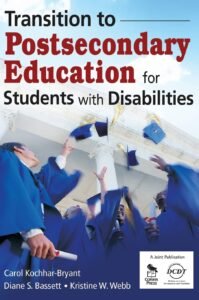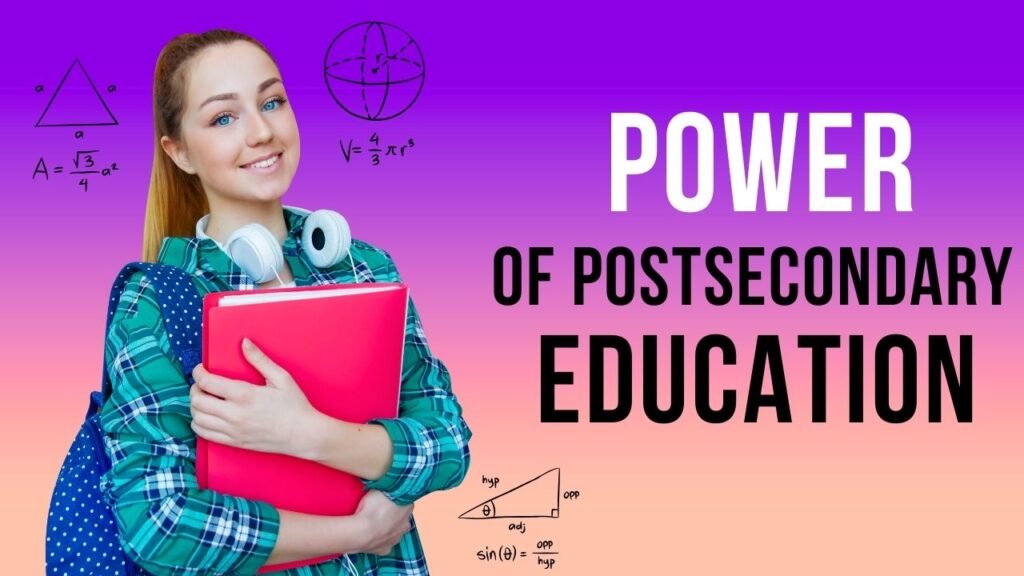Table of Contents
ToggleIntroduction
Postsecondary education provides chances and plays an important part in developing people for their future endeavors. It acts as a link between the initial stages of secondary education and the specific knowledge required for professional success. In this thorough guide, we will delve into the essence of postsecondary education, study its relevance and benefits, and answer commonly asked questions (FAQs) to provide you with complete knowledge.
Starting your postsecondary education path is like entering a new world of possibilities. It’s a period for exploration, discovery, and personal development. Whether you want to take a traditional academic path or learn practical skills through vocational training, postsecondary education provides a wide range of alternatives to suit your interests and goals.
Beyond the acquisition of knowledge, postsecondary education provides individuals with vital skills such as critical thinking, problem solving, and effective communication. These abilities are required not only for success in the profession but also for managing the intricacies of daily life.
Join us as we explore the secrets of postsecondary education, shed light on its transforming potential, and enable you to make educated decisions that will define your future. Explore the numerous benefits, overcome common misunderstandings, and go on a journey of self-discovery as you pursue higher education.
What is postsecondary education?
Postsecondary education encompasses any sort of study that occurs after completing secondary school. It covers a diverse range of programs, including universities, colleges, vocational schools, and technical institutes. This stage of education offers several chances for students to earn advanced knowledge, skills, and certificates relevant to their interests and career ambitions.
Postsecondary education is differentiated by its emphasis on specific areas of study, practical training, and experiential learning. It prepares students for certain vocations or teaches them the critical thinking, problem-solving, and communication skills necessary for success in the industry.
In essence, postsecondary education connects the underlying information gained in secondary school to the specialized expertise required in numerous professions and sectors. It provides a varied range of opportunities for individuals to achieve their academic and career goals, thereby molding the future workforce and contributing to societal growth.
Read More : Top 10 Universities in India
Exploring Postsecondary Pathways
- Traditional University Programs: Traditional colleges offer a diverse choice of undergraduate and graduate degrees in several subjects. These programs frequently produce academic degrees such as bachelor’s, master’s, and doctoral degrees.
Traditional universities provide students with a full academic experience that includes hard coursework, faculty mentorship, and a prospering campus culture. Undergraduate programs are typically four years long and include a comprehensive liberal arts education with specialized study in the chosen major. Students can participate in research, internships, study abroad programs, and extracurricular activities, which expand their educational experience and promote personal growth.
Graduate programs at traditional universities provide additional education and specialization in specialized fields. Master’s programs typically take one to two years of full-time study and may include a thesis, project, or comprehensive examination. Doctoral programs, on the other hand, are very research-intensive and can last several years, culminating in the submission of a dissertation and the awarding of a doctoral degree.
Traditional universities promote intellectual curiosity, critical thinking, and collaborative learning. Interactions with peers and faculty members provide students with opportunities to learn from different views and form lifelong connections. Furthermore, traditional colleges frequently showcase cutting-edge buildings, libraries, and resources, which improve the learning experience for students pursuing higher education.

- Community Colleges: Community colleges provide accessible and affordable postsecondary education, including associate degrees, certificates, and vocational training programs. They cater to a varied student body and frequently act as stepping stones to four-year universities.
Community colleges play an important role in higher education by providing flexible scheduling alternatives, such as evening and weekend programs, to students with a variety of commitments, including employment and family responsibilities. Many community colleges also have agreements with local industry, which provide students with internships, job placements, and hands-on experience in their chosen disciplines.
Furthermore, community institutions create a conducive learning atmosphere through smaller class sizes and personalized attention from professors. This caring environment allows students to excel academically while also developing the confidence and abilities required for success in higher education and the workplace.
Furthermore, community colleges value diversity and inclusivity, inviting students from a variety of backgrounds, including recent high school graduates, adult learners, veterans, and those looking for career changers or skill enhancements. These colleges promote accessibility and affordability, frequently providing financial aid, scholarships, and tuition assistance programs to ensure that education is accessible to all.
In addition to academic programs, community colleges offer a wide range of resources and support services to assist students in effectively completing their education. These services may include academic advising, tutoring centers, career counseling, and transfer aid for students who intend to continue their education at four-year universities.
Overall, community colleges are great assets to their communities, allowing students to pursue their educational and career aspirations while also contributing to the social and economic vitality of the areas they serve.


Add this Guide to your Edition
- Vocational and Technical Institutes: Vocational and technical institutes play an important role in educating people for professions in specialized industries like healthcare, technology, auto repair, and culinary arts. These institutes provide concentrated training programs that give students the practical skills and hands-on experience required for success in their chosen professions. Unlike traditional academic schools, vocational and technical institutes promote experiential learning and real-world application to ensure that graduates are confident and competent when they enter the industry. Students enrolled in these programs, whether they want to be skilled tradesmen, IT professionals, automotive technicians, or culinary experts, receive immersive instruction customized to the needs of their respective sectors.Vocational and technical institutes bridge the gap between school and employment by creating a dynamic learning environment that combines classroom instruction with hands-on workshops and internships, encouraging learners to pursue rewarding and lucrative careers.

You Can Also Read: How to Save Money in Your 20’s
Online Learning Platforms: Online learning platforms have transformed postsecondary education by providing flexible and convenient alternatives to traditional classroom instruction. They offer a diverse range of courses and certifications to learners globally. Whether you want to improve your present abilities, discover new hobbies, or make a career move, online learning platforms provide unmatched flexibility and accessibility.
Online learning allows students to tailor their learning experience to their schedule and preferences. They can study at their own pace, whether in the evenings, on weekends, or while on the go. Furthermore, online courses frequently use multimedia resources, interactive quizzes, and discussion forums to improve participation and learning outcomes.
One of the primary benefits of online learning platforms is their cost and accessibility. Compared to traditional postsecondary institutions, online courses are frequently less expensive, with many platforms providing free or low-cost options. This makes education more accessible to people from all socioeconomic levels, regardless of their geographic location or time constraints.
Furthermore, online learning platforms include a wide range of interests and subjects, from business and technology to the arts and humanities. Whether you want to learn computer languages, improve your digital marketing skills, or delve into the complexities of literature, there is a course for you.
To summarize, online learning platforms equalize access to education by offering learners the flexibility, affordability, and variety of options required to succeed in today’s fast-paced environment. Whether you’re a working professional looking to advance your skills or a lifelong learner pursuing your passions, online learning platforms provide limitless options for growth and development.


Equip Yourself for Success with the Right Tools 🚀
The Significance of Postsecondary Education
Postsecondary education has a significant impact on individuals’ professions, personal growth, and society’s progress. Here are some fundamental reasons why postsecondary education is important:
- Career Advancement: Postsecondary degrees improve employability and lead to higher-paying career opportunities. They provide individuals with specific information and abilities that corporations in a wide range of industries value. In today’s competitive employment market, companies frequently prefer applicants with additional education and specialized training. Postsecondary graduates are more prepared to respond to changing industry trends, technologies, and employment needs. Additionally, acquiring a degree displays a dedication to lifelong learning and professional development, distinguishing them as proactive and dedicated professionals. A postsecondary degree provides individuals with access to a greater choice of employment options and growth paths, allowing them to pursue their professional goals with confidence and competence.
- Personal Growth: Postsecondary education creates an environment conducive to personal development and intellectual curiosity, allowing students to delve deeper into undiscovered concepts, various viewpoints, and newly discovered hobbies. By participating in demanding academic and extracurricular activities, students are encouraged to question, evaluate, and synthesize knowledge, strengthening their critical thinking skills. Furthermore, the creative freedom provided in postsecondary settings allows individuals to legitimately express themselves, encouraging an environment of invention and experimentation. Students adopt a lifelong learning attitude and embark on a journey of self-discovery and continual progress, armed with the tools and confidence to navigate an ever-changing world.
- Economic Prosperity: Investments in postsecondary education contribute to economic growth by encouraging innovation, entrepreneurship, and workforce development. Individuals with higher education levels help boost productivity and economic competitiveness. When educated people enter the workforce, they bring with them innovative ideas, critical thinking abilities, and specialized knowledge, which propel technical developments and corporate innovations. Furthermore, postsecondary institutions frequently act as hubs for research and development, encouraging collaboration between academics and industry. This partnership results in the development of new technology, products, and services, which boost economic growth and create job possibilities. Furthermore, an educated workforce is better prepared to adapt to shifting market demands and developing industries, assuring long-term economic growth in an ever-changing global context.
Conclusion
Postsecondary education is a transformative journey that enables people to achieve their academic, career, and personal goals. It opens up a world of unlimited possibilities, allowing people to reach their greatest potential and make important contributions to society. Understanding the numerous paths and opportunities available enables students to make informed decisions that will lead to success in a constantly changing global world. Individuals who pursue higher education embark on a lifelong path of knowledge, progress, and fulfillment.
FAQ
Most frequent questions and answers
Postsecondary education refers to any form of education beyond high school, including college, university, and vocational training. It is essential as it equips individuals with the knowledge, skills, and credentials needed to succeed in today’s competitive job market.
Postsecondary education offers numerous benefits, including higher earning potential, expanded career opportunities, and personal growth. It also fosters critical thinking skills, creativity, and adaptability, essential qualities in a rapidly evolving world.
Common challenges include financial constraints, academic pressures, and uncertainty about career paths. However, with resilience, resourcefulness, and support, these challenges can be overcome.
Students can explore financial aid options such as scholarships, grants, and student loans. Additionally, working part-time, applying for work-study programs, and seeking out low-cost educational alternatives can help mitigate financial barriers.
By setting clear goals, seeking mentorship, and actively participating in extracurricular activities, individuals can enrich their postsecondary education experience and maximize their potential for success.
Postsecondary education plays a crucial role in driving economic growth, fostering innovation, and promoting social mobility. By equipping individuals with the skills and knowledge needed to thrive in the workforce, it contributes to the overall advancement of society.



Pingback: Top 10 Universities in India: Rankings and Reviews - InfoSpace Hub